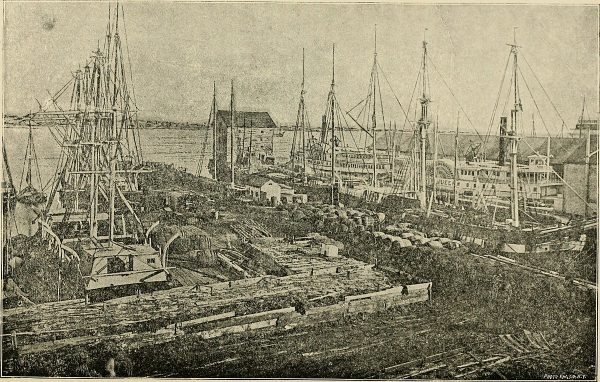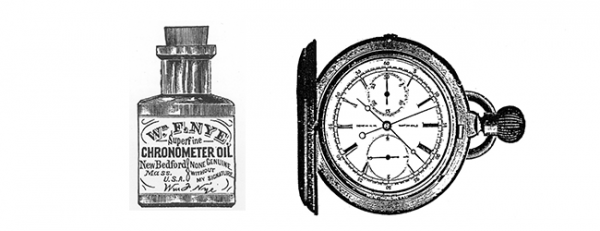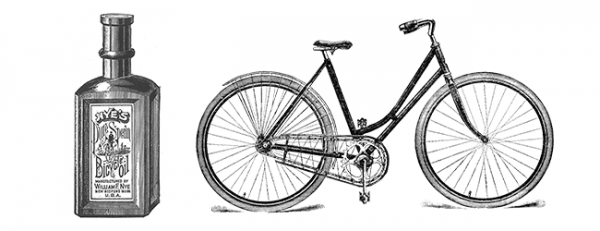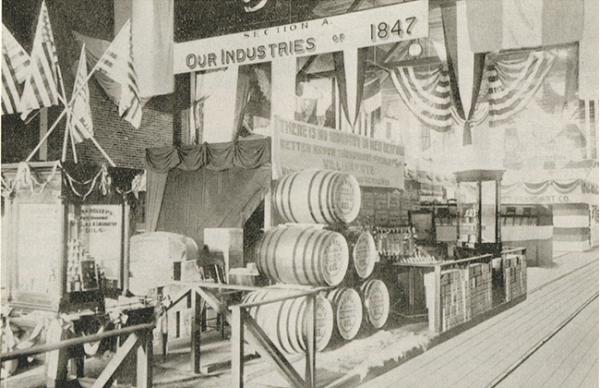A Whale-Oiled Machine – 99{1668a97e7bfe6d80c144078b89af180f360665b4ea188e6054b2f93f7302966b} Invisible
In the 1800s, whaling was a wide and brutal industry–sometimes as deadly for the sailors concerned as it was for the whales. And the worldwide epicenter of whaling could be found in New Bedford, MA. All this slaughter wasn’t to feed hungry individuals with whale meat. It was about all the issues individuals could make out of whale blubber, which includes cleaning soap and of program: lantern gasoline. It burned bright and smoke-absolutely free.

Whale oil rendered in landed in New Bedford was offered to mild street lamps, properties and businesses all around the globe. The city even adopted the Latin motto Lucem diffundo which indicates “I spread light”. The phrase can even now be observed stamped on the sidewalks exterior of town corridor. And then, way too, there were all of the methods oil could be used as a lubricant, which include but not constrained to use on: bicycles, bolts, cameras, carriages, money registers, tapped arms, chisels clippers, cutlery, doors, dentists’ resources, followers, firearms flooring, fishing reels, flutes, furniture, golf golf equipment, harnesses, horses, hoofs, freezers, and locks.

In the 1800’s, whaling reworked New Bedford from a sleepy fishing city into 1 of the wealthiest metropolitan areas in the world. Fruitful whaling voyages designed broad fortunes for the retailers and financiers that ran the industry. Modern society gentlemen and women of all ages strutted by way of town sporting the latest trends in European fashion. And colourful Victorian mansions sprang up by the dozens. All developed with that sweet sweet whale revenue.
The whaling industry pulled in everyone seeking to make a quick buck. And one particular of those persons was a regional, New Bedford businessman named William F. Nye. Nye was something of a serial entrepreneur. He experienced dabbled in all the things from promoting fruit to setting up church organs. And, like just about every person in town, he seemed to whales for his future big rating. Nye recognized there have been currently loads of people hawking New Bedford whale oil for lamps and soap. All those marketplaces were being saturated. But in 1865, he uncovered a new way to market whales to the planet.
For most of history, devices were lubricated with no matter what neighborhood materials was lying around — animal fats, vegetable oil, often just h2o or mud. But the industrial revolution brought an explosion of new varieties of equipment. Factories sprung up, brimming with steam engines and spinning equipment and looms. Every little thing newer, larger, and faster…and in need of lubrication. And instantly, whatever peanut oil was lying about was no for a longer time good sufficient to keep the modern day mechanical earth shifting at top rated velocity. The 1800s saw a wave of patents for new sorts of lubricant. These ended up not components just plucked out of mother nature, but refined and mixed alongside one another. There were blends of graphite and lard, olive oil with rock dust.
 It was a entire world full of friction. Scientists and engineers ended up racing to layout quality lubrication for it. And William F. Nye understood there was something distinctive about the oil from these big marine mammals landing in the port of New Bedford. by the 50 percent-million. Amid other points, whale blubber stays slippery and it does not congeal in the chilly like other oils. Whale oil is also non-corrosive. It doesn’t don down metals. A crucial top quality offered the proliferation of metallic equipment at the time. Oil from sperm whales was a significantly good all-temperature lubricant — and sperm whales live everywhere you go from the equator all the way to the edge of the sea ice in both the Arctic and Antarctic.
It was a entire world full of friction. Scientists and engineers ended up racing to layout quality lubrication for it. And William F. Nye understood there was something distinctive about the oil from these big marine mammals landing in the port of New Bedford. by the 50 percent-million. Amid other points, whale blubber stays slippery and it does not congeal in the chilly like other oils. Whale oil is also non-corrosive. It doesn’t don down metals. A crucial top quality offered the proliferation of metallic equipment at the time. Oil from sperm whales was a significantly good all-temperature lubricant — and sperm whales live everywhere you go from the equator all the way to the edge of the sea ice in both the Arctic and Antarctic.

Many of his first buyers were being whalers on their own. He bought the refined oil from sperm whales and some other species as a lubricant for timepieces, which includes chronometers. Those people equipment served ships navigate at sea, typically for several years on end. Nye’s organization grew, and he moved his refining operation from his kitchen area, into a retail outlet front and finally into an total manufacturing unit exactly where he could make lubrication for all the new fangled machines coming to the American home.

Nye was not the only a single refining whale oil into lubricant. But it was Nye who had the strategy to specialize — to engineer a exclusive refining process for just about every application of lubricant. He made a tremendous-fine lubricant just for new music packing containers. And thicker 1 just for firearms. For each individual equipment, he experienced a lubricant. Nye led the charge of oil refiners who applied the ideas of chemistry, physics and engineering to the trouble of friction.
By 1900, Nye experienced begun experimenting with lubricant from distinct resources, like olive oil and neat’s-foot oil designed from cattle bones. His specialty, even though, remained his substantial-finish whale oil, which he was shipping to keen consumers all about the world. Nye had attained what he set out to do: open up a whole new market for whale-dependent goods, and make a great deal of money carrying out it. But the early decades of the 20th century brought what we know currently as: provide chain issues.

By decades of overfishing, New Bedford’s whalers had harpooned on their own in the foot. Whales grew scarce. And ships had to chase their remaining prey additional and even more out to sea. The very last whaling ship from New Bedford Harbor sailed in 1927. The city’s when-vibrant mansions fell into drab disrepair. And Nye’s source of raw resources mostly dried up. The marketplace for lubricants was taken in excess of by much less expensive, petroleum-dependent solutions.
Petroleum merchandise have been horrible for the local climate and poisonous to folks living in close proximity to refineries. But as lubricants, they experienced a lot going for them. They had been low cost and they could be mass-created by oil companies. And they didn’t call for demise-defying many years-very long voyages in pursuit of an elusive white whale.: But just for the reason that oil providers could make lubricants on a massive scale, does not necessarily mean all those lubricants labored completely. In 1966, a British engineer named Peter Jost posted a paper that would grow to be the structure for the little-but-growing industry of study he dubbed: tribology. The review of friction, use, and lubrication. It found that unneeded put on and tear on machinery–caused by terrible lubrication–was dragging down the nation’s productiveness by extra than 1 p.c of GDP, the equal of billions of pounds.

All around the time of the Jost report, Nye’s couple of remaining staff commenced tinkering with a new style of lubricant. Not whale oil, not petroleum, but artificial lubricant–made with new types of substances cooked up in the lab. Synthetics intended the enterprise could turbocharge their planning of specialty lubricants for specific purposes. Mainly because now there were so a lot of different chemical compounds to try out.
 As the pc period dawned, Nye put in the late 20th century crafting personalized lubricants that were just proper for holding keyboards clacking, printers printing, and really hard drives spinning at hundreds of rotations for every moment. With a focus on synthetics, the firm created by itself back again up. Nowadays they make extra than 1000 distinct lubricants, every intended to permit the most important systems of our time. Like the Perseverance Rover presently discovering the surface of Mars — not to point out Xbox controllers.
As the pc period dawned, Nye put in the late 20th century crafting personalized lubricants that were just proper for holding keyboards clacking, printers printing, and really hard drives spinning at hundreds of rotations for every moment. With a focus on synthetics, the firm created by itself back again up. Nowadays they make extra than 1000 distinct lubricants, every intended to permit the most important systems of our time. Like the Perseverance Rover presently discovering the surface of Mars — not to point out Xbox controllers.
Great grease doesn’t happen by incident. It’s taken hundreds of years of watchful style and advancement to keep our machines running, from the seafaring age to the digital age. Even though William Nye was chasing a fad when he acquired into the whale business enterprise, he stumbled upon providing a remedy to a challenge that would will need resolving right up until the conclusion of time.